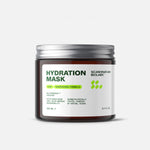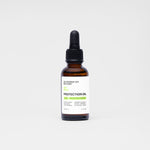Going to the beach must be one of the most exciting activities in summer, which provides several health benefits for both the body and the mind.
But when it comes to hair, the exercise might be a double-edged sword.
In this article, we'll go through the burning question - Is salt water good for your hair?[[textbox]]
Table of content
Summary
Saltwater can be both good and bad for your hair depending on how it's used.
On one hand, salt water can help to create texture and volume in your hair, as well as enhance your natural waves or curls.
On the other hand, frequent exposure to salt water can also cause dryness, brittleness, and breakage, especially if you have colour-treated hair.
Additionally, the salt in the water can strip your hair of its natural oils, leading to further dryness and damage.
Therefore, it's important to use salt water in moderation and follow up with hydrating treatments and conditioners to keep your hair healthy.[[textbox]]
As your leading source for hair health information over the past 4 years, we never compromise on accuracy. When it comes to your health, you deserve information you can truly rely on - and earning your trust is our top priority.
Here's how Scandinavian Biolabs ensures every piece of content meets the highest standards of accuracy and integrity:
- Credentialed Experts: Our reviewers are actively practicing doctors and medical researchers
- Stringent Reviews: Content undergoes rigorous editing by subject specialists and review by a practicing doctor.
- Evidence-Based: We rely on well-established research from trusted scientific sources like peer-reviewed journals and health authorities.
- Full Transparency: Our editorial standards, writer credentials, reviewer credentials, correction process, and funding are all publicly documented.
- Independent Voice: While we do promote products, we operate in a vacuum to business operations. Our main goal is just an unwavering commitment to providing medically-sound guidance.
You can count on Scandinavian Biolabs to consistently deliver the trustworthy health information you deserve. Read our Editorial Standards.
Is saltwater good for your hair?
All in all, avoid submerging your hair in salt water for too long, moisturise it generously before and after taking the swim, and your hair will be safe throughout summer.
Like everything else, it's good in moderation. While there are certain benefits to being exposed to salt water, there are specific steps mentioned above you can take to keep your hair from becoming dehydrated and brittle.
Cosmetics can provide us with beach waves in a bottle during the winter, but now that summer vacation is here, we can enjoy the real deal while sipping on our favourite cocktail on the beach.
What is seawater composed of?
Seawater is mostly composed of water together with 2,5 % - 3,5 % salt and smaller amounts of other substances.
Talking about the salt in seawater, it is much more complicated than you may think. It comes from diverse mineral deposits that are dissolved in seawater through the water cycle. Besides sodium and chloride ions, there are 92 other elements that are present to some extent (see Figure 1). These ions are derived from various activities including the internal chemistry of the ocean, the dissolving of biological materials, sediments from the bottom of the sea, and the runoff from the land.
Salinity, or the amount of salt in seawater, varies depending on the specific location.


How does saltwater damage your hair?
Seawater has a high concentration of minerals and vitamins, which helps to detoxify the skin, reduce swelling, and treat wounds, among other things. However, it is important to acknowledge its potentially harmful effects on your hair.
First of all, we should agree that average exposure won’t hurt. It is even beneficial if you take advantage of seawater properly. But constant saltiness combined with an increase in temperature during the summer may cause hair shedding or other types of hair damage.
Moisture-wicking
Your hair, like your skin, is soft, elastic, and moisturised due to its high water content. In that regard, hair can become dehydrated when too much moisture is lost.
With its high salt content, seawater can draw water out of your hair and scalp. Natural oils in your scalp could also be reduced thanks to the cleansing effect of saltwater.
You could notice that blow-drying your hair will take longer, or that curling or maintaining a style is challenging after you visit the beach. Being stripped of its natural oils and losing moisture, hair becomes dry, brittle, and more fragile.
Strand-twisting and frizzing
Moreover, saline water could disturb different bonding interactions inside hair strands and create additional cross-links. Thus, beyond giving your beautiful beach waves, salt water could impair your hair strength, and eradicate its shine and smoothness.
Hair-splitting
In its most extreme form, besides dandruff, saltwater damage also causes hair to split at the ends and leads to breakage. These effects are even worse on dyed or processed hair. If your hair is colored, saltwater damage not only gives it a rough texture but alters its color as well. So remember to take extra care of your dyed hair.
Without proper treatments, after several months of summer, your hair can turn lifeless, snarled, and harsh to the touch.
Why does salt water cause such damage?
Hair shafts swelling with water
Hair is permeable to water, implying that too much swimming can enhance water penetration into hair. If the hair cuticle is already damaged or over-porous, repeated wetting may cause a negative impact on the hair shaft condition.
When immersed in the sea, your hair shafts swell with water, given that the protecting effect of the cuticle is already inhibited by prior impairment. Its repeated expansion and contraction gradually weaken the hair. In addition, swimming could also hurt hair cuticles by friction with the water.
The osmosis effect
The process of moving water across a semipermeable membrane (a type of barrier that lets certain particles pass through while blocking others) to balance the solute concentrations between two areas is called osmosis.
When your hair submerges in seawater, there is a difference in the salt concentrations between the water within your hair and the salt water surrounding it. Thus, a reaction happens where water moves from an area of lower salt concentration (your hair) to an area of higher salt concentration (seawater).
In turn, this procedure removes moisture from the interior of your hair strand, leaving it dry and brittle. Furthermore, in the condition of lacking moisture, hair is more prone to flyaways, or in other words, frizzing.

Increasing hydrogen bonds and salt crystals
When you swim on the beach, the keratin protein becomes dehydrated. Such dehydrated environment enables molecules in salt water to enter the hair fiber, breaking up the hair’s preset hydrogen bonds and forming new ones.
Therefore, you will need more time to blow-dry your hair and any styling work is much more difficult after a visit to the beach.
After swimming, the salt in seawater could leave behind hard crystals on your hair which further develops mechanical abrasion to the cuticle. You can notice the rougher hair surface and an unpleasant hair texture as a result of these crystals. Tangling increases as well when adjacent hairs are more prone to get caught together.
Now let's talk about several benefits you could gain from swimming in the sea.
Seawater benefits for hair
Anti-fungal shampoo
Saltwater is an effective natural shampoo. Occasional wash in salty water can help you to get rid of excess heavy oils, thus preventing greasy hair. The result: fresh, clean scalp and hair. It is also known to add volume and eliminate dandruff from your hair.
Eco-friendly exfoliator
You get a free, natural exfoliation for your scalp by swimming in the sea. The mineral-rich seawater crystals may function as an excellent exfoliant for your scalp, removing product buildup from hair roots and stimulating blood flow.
Natural nutrients and minerals
Saltwater is rich in nutrients that your body needs. Magnesium, for example, is known to help strengthen your neural system and relax your muscles. Magnesium's calming effect is beneficial and has been linked to increased hair growth.

How to protect your hair from saltwater damage?
We have discussed the pros and cons above, but it can be hard to sacrifice swimming in the cooling waves for your hair.
But don’t worry! We do have some tips you can follow, so you don't have to choose between having some summer fun and your locks.
- Get your hair soaked up with fresh water before paddling out. Like a sponge, your hair will fully absorb moisture from freshwater, leaving less room for seawater. As a result, less damage from the saltiness of water!
- Rinse the hair well immediately after exposure to the seawater to prevent it from evaporating and leaving damaging salt crystals behind. Meanwhile, other nasty stuff such as sand, dirt, debris, and chemicals that are stuck in your hair can also be removed.
- Try using shampoo and conditioner that contain ingredients with hydrating properties. You could also thoroughly moisturise your hair with a leave-in conditioner or natural oils.
- Consider swim caps if possible. They are a great way to keep your hair away from the saltiness at the beach.
Bonus sun tip:
To help protect your scalp from UV radiation, use a protective hair cream with SPF on your hair. Another simple yet efficient method is to soak a Q-tip in broad-spectrum sunscreen and apply it directly on the section line.
This should be done before heading to the beach to provide time for it to soak and offer total covering and protection.
FAQs
Is saltwater good for your hair?
Saltwater can have both positive and negative effects on hair. On one hand, the salt in the water can help add texture and volume to hair, making it easier to style. On the other hand, salt water can also strip hair of its natural oils and moisture, leaving it dry and brittle.
What does saltwater do to your hair?
Saltwater can dry out hair and strip it of its natural oils and moisture. This can make hair feel rough, brittle, and difficult to manage. However, salt water can also help add texture and volume to hair, making it easier to style.
Is salt bad for your hair?
Salt can be bad for hair if it is applied excessively or if hair is exposed to high levels of salt on a regular basis. Salt can strip hair of its natural oils and moisture, leaving it dry, brittle, and prone to breakage.
Does salt water cause hair loss?
There is no direct evidence to suggest that salt water causes hair loss. However, excessive exposure to salt water can cause hair to become dry and brittle, which can increase the risk of breakage and hair loss.
What happens if we apply salt to hair?
Applying salt directly to hair can have a variety of effects, depending on the amount of salt used and the individual's hair type. In general, salt can help add texture and volume to hair, but it can also dry out hair and make it feel rough and difficult to manage.
It is important to use salt in moderation and to rinse hair thoroughly after applying salt to avoid damaging hair.
EDITOR'S PICK:
- Does Lack Of Sleep Cause Hair Loss?
- The Truth About Caffeine Shampoo You Should Know!
- Mature Hairline: What Is It & How To Handle
References
https://biologydictionary.net/osmosis/
https://salinity.oceansciences.org/science-salinity.htm
Robbins CR, Chemical and Physical Behaviour of Human Hair (5th ed), 2012. DOI: 10.1007/978-3-642-25611-0.
Chester, Jickells, Roy, Tim (2012). Marine Geochemistry. Blackwell Publishing. ISBN 978-1-118-34907-6.
Tur E (ed): Environmental Factors in Skin Diseases. Curr Probl Dermatol. Basel, Karger, 2007, vol 35, pp 103–117.




